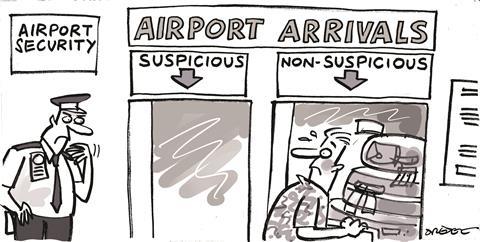We should be grateful when narcissists are exposed and justice follows. But there’s a dark side to increased levels of suspicion, warns Jeff Lucas

Passing through an airport recently, I wondered why I felt on edge. I’ve always felt that airports are emotional black holes – people are only there because they want to be somewhere else – but there was a niggle that I couldn’t put my finger on.
When I reached the security line, all became clear. Airports are now places where overt suspicion hangs heavy in the atmosphere. The fact that we are required to place laptops in one tray and shoes in another is evidence that we are viewed as those who could be carrying a portable nuclear warhead – or something worse, like a bottle of water.
Added to this, scam culture increases our suspicions. Most know that the email suggesting someone wants to gift us £1m is a crude ruse but, these days, I leap into narrowed-eyed suspicion the moment an unidentified number appears on my mobile phone.

Recent scandals in the Church have alerted us to abusive, entitled leaders who treat God’s kingdom as their own, bullies who systematically crush colleagues and congregants with layers of shame and gaslight any who protest.
While we’re tempted towards suspicion with good reason, we need to tread gently. We should be grateful when narcissists are exposed and justice follows. But there’s a dark side to increased levels of suspicion.
Truth is priceless, and we should all be aware of the danger of false teaching. The Bible is full of warnings about the toxicity of error, but there are some who seize upon an unguarded comment or an out-of-context aside and quickly cry that the alleged witch needs burning.
In warning Timothy against false teachers, Paul identifies “evil suspicions” as a characteristic of those who would lead God’s people astray. Ironically, some of the heresy hunters who relish finger pointing have themselves become false teachers because of their obsessive faultfinding (1 Timothy 6:4).
Christians can also use pious language to malign others. Commenting about a successful church leader, a fellow minister told me that he was concerned there was something dark lurking in the man’s life. “I can’t put my finger on it, but there’s something deeply wrong with that chap. I’m sure it’s going to come out into the light sooner or later.” Disguising suspicion as discernment, and without any proof of anything, a shadow was cast over what might well be an innocent character.
Some heads of Christian organisations have told me they are struggling to fulfil their difficult calling to lead in the current culture. When a staff member is not doing their job to the right standard, a call to better performance is not controlling or abusive behaviour – it’s leadership taking responsibility seriously.
In the tragic story of the enmity that King Saul felt towards David, we discover that insecurity and jealousy fuelled Saul’s anger. Hearing a song that celebrated David’s military victories was topping the charts, he was furious and “looked at David with suspicion from that day on” says 1 Samuel 18:9 (NASB, 1995).
Perhaps we should all be a little more suspicious – not of others, but of ourselves and our own suspicions. When we hit out because we have been hurt in the past, when envy is lurking or when we simply don’t like someone, we should be slow to speak and quick to pray.
Naivety is foolish. Abuse must be confronted. But when evil suspicion has its way, the list of victims simply grows.





































No comments yet